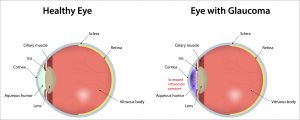Glaucoma is an eye condition that occurs when fluids create sufficient pressure in the eye, so it damages the optic nerve. The optic nerve is the part that takes the information from the eyes and transmits it to the brain. The damages caused to the optic nerve can lead to reduced vision or even complete and irreversible blindness.

Glaucoma Causes
There are a couple of types of glaucoma, originating from various causes such as:
This is a chronic type of glaucoma that can cause a severe vision loss. It can appear without any symptoms or warning. There is no conclusive reason what causes open-angle glaucoma, although some experts speculate that some eyes can’t drain fluids as they should. That creates high pressure in the eye which leads to damages in the optic nerve and loss of vision.
Unlike the chronic, open-angle glaucoma, this is an acute condition that strikes fast and is followed by severe pain. The closed-angle glaucoma is a severe condition that if not treated right away can lead to permanent loss of vision. It occurs when the region between the iris and the cornea cannot drain the fluid.
-
Secondary Glaucoma
This type of glaucoma normally happens because of some other medical condition, medications, irregularities, or injuries.
-
Normal Tension Glaucoma
This is a quite rare type of glaucoma in which the pressure in the eye is normal, or at the very least not that high as to be considered dangerous. However, even with normal pressure, the optic nerve is damaged.
Glaucoma Symptoms
In most cases, Glaucoma is not followed by any noticeable symptoms. That makes it almost impossible to detect the condition until it’s too late. The only thing one can do is to visit an eye doctor regularly. That way the eye doctor can check for ocular hypertension that can lead to glaucoma.
Closed-angle is the only type of glaucoma that manifest specific symptoms and signs like blurred vision, headache, intense eye pain, vomiting, and nausea.
Glaucoma Treatment
The best way to deal with glaucoma is to catch it in its early stages. Best case scenario, prescription eye drops can lower the eye pressure or improve the drainage flow. If that doesn’t work, then a glaucoma surgery with a focused laser beam can either modify the existing drainage routes or create new ones. However, surgery can’t reverse damage caused by glaucoma. That is why it is super important to have regular eye check-ups.

